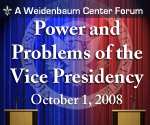Washington University will offer a crash course on the changing role of the American vice presidency as it hosts a panel of experts for a public forum from 7:30 p.m. to 9 p.m., Oct. 1, in Room 100, Brown Hall, Danforth Campus.

Coming on the eve of the nationally televised vice presidential debate between Democrat Joe Biden and Republican Sarah Palin, which takes place in the University’s Athletic Complex at 8 p.m. on Oct. 2, the vice presidential experts forum provides the St. Louis community with an educational warm-up for the big debate on Tuesday.
Experts will be speaking on the influence of vice presidential choice on the general election, the role of the vice president, and vice presidential power. The forum features talks and discussion by a panel of leading experts on the vice presidency, including Joel Goldstein of Saint Louis University; Douglas Kriner of Boston University; Michael Nelson of Rhodes College; and James Pfiffner of George Mason University.
Titled “Power and Problems of the Vice Presidency,” the program is free and open to the public. The program, part of the Weidenbaum Center Forum series, is sponsored by the Weidenbaum Center on the Economy, Government, and Public Policy. For more information, contact Melinda Warren at 314-935-5652 or warren@wustl.edu
Joel K. Goldstein
Adjunct Professor of Law
Washington University in St. Louis
Goldstein is member of the law faculty at St. Louis University. At highly respected presidential and constitutional scholars, he has written widely on the vice presidency, consulted on vice presidential selection and is frequently interviewed on the subject. Currently, he is writing a book about the relationship between the presidency and the U.S. Supreme Court. His doctoral dissertation grew into his first book, “The Modern American Vice Presidency: The Transformation of a Political Institution.” His journal publications include extensive articles on the executive branch and constitutional law. He is a contributor to the Encyclopedia of the American Constitution and the Encyclopedia of the American Presidency. In 2003, he organized “Brown v. Board of Education: 50 Years Later,” a comprehensive conference examining the impact of the “separate but equal” decision on the American education system. He received a doctorate in political science at Oxford University, which he attended as a Rhodes Scholar, and a law degree from Harvard Law School, where he was a note editor of the Harvard Law Review. Goldstein joined the St. Louis University School of Law in 1994 and was named associate dean of faculty in 2001.
James P. Pfiffner
University Professor in the School of Public Policy
George Mason University
Pfiffner’s major areas of expertise are the Presidency, American National Government, and public management. He has lectured on these topics at universities in Europe and throughout the United States as well as at the Federal Executive Institute, the National War College, the U.S. Military Academy, and the Departments of State, Justice, and Defense. He has written or edited twelve books on the presidency and American National Government, including The Strategic Presidency: Hitting the Ground Running (2nd edition, 1996), The Modern Presidency (4rd edition, 2004), and The Character Factor: How We Judge Our Presidents, (2004). His book, Power Play: The Bush Administration and the Constitution, was by Brookings in 2008. He has also published more than 100 articles and chapters in books, professional journals, reference works, and the popular press.
Douglas Kriner
Assistant Professor, Political Science
Boston University
Doug Kriner completed his undergraduate work in political science and history at MIT in June of 2001 and received his Ph.D. in political science from Harvard in May of 2006. He serves at the Director of Undergraduate Studies. Doug’s research interests concentrate on American political institutions and the importance of inter-institutional dynamics in shaping political strategies and policy outcomes. Through both quantitative and qualitative analyses, his dissertation examined how congressional constraints have shaped presidential conduct of major military actions from the end of Reconstruction to the war in Iraq. New research endeavors include a study of the immediate and lingering social and political ramifications of military action for the polity and a recently begun study of congressional investigations of the executive branch from the mid-19th century to the present. Areas of specialization include American Politics, Separation of Powers, Domestic Politics and the Use of Force.
Michael Nelson
Professor of political science
Rhodes College, Memphis, Tenn.
Nelson, a former editor of The Washington Monthly, is a professor at Rhodes College and a non-resident senior fellow at the Miller Center of Public Affairs at the University of Virginia. More than forty of Nelson’s articles have been anthologized in works of political science, history, and English composition, and he has won national writing awards for his articles on music and baseball. His most recent books are “The Presidency and the Political System” (now in its eighth edition), and “Debating the Presidency: Conflicting Perspectives on the American Executive” (edited with Richard J. Ellis). He is currently writing books about the 1968 election and the 2008 election.
Hear podcast of Nelson talk on presidential debates at Ole Miss (.mp3)